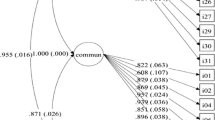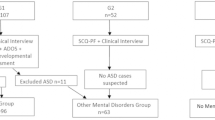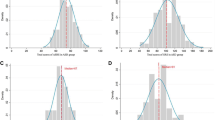Abstract
The Adult Autism Quotient (AQ), the Empathy Quotient (EQ) and the Relative’s Questionnaire (RQ) were used as part of the Adult Asperger’s Assessment (AAA) by a diagnostic service for adults without an intellectual disability with suspected autism spectrum disorder (ASD). This service is part of the National Health Service (NHS) in England. Little is known about the utility of these structured questionnaires despite wide use in clinical practice. It was investigated whether the questionnaires could discriminate between individuals with and without a diagnosis of ASD. Receiver Operating Curve analysis showed good levels of sensitivity to detect a positive diagnosis, but the specificity to exclude those without a diagnosis was poor. A binary logistic regression showed that a combination of the questionnaires also showed limited diagnostic validity. These findings have clinical implications in reviewing the efficiency of the assessment process.

Similar content being viewed by others
References
American Psychiatric Association. (2013). Diagnostic and statistical manual of mental disorders (5th ed.).). Washington, DC: Author
Allison, C., Baron-Cohen, S., Wheelwright, S. J., Stone, M. H., & Muncer, S. J. (2011). Psychometric analysis of the Empathy Quotient (EQ). Personality and Individual Differences, 51(7), 829–835
Ashwood, K. L., Gillan, N., Horder, J., Hayward, H., Woodhouse, E., McEwen, F. S. … Cadman, T. (2016). Predicting the diagnosis of autism in adults using the Autism-Spectrum Quotient (AQ) questionnaire. Psychological Medicine, 46(12), 2595–2604
Baron-Cohen, S., & Wheelwright, S. (2004). The empathy quotient: an investigation of adults with Asperger syndrome or high functioning autism, and normal sex differences. Journal of Autism and Developmental Disorders, 34(2), 163–175
Baron-Cohen, S., Wheelwright, S., Robinson, J., & Woodbury-Smith, M. (2005). The Adult Asperger Assessment (AAA): a Diagnostic Method. Journal of Autism and Developmental Disorders, 35(6), 807–819
Baron-Cohen, S., Wheelwright, S., Skinner, R., Martin, J., & Clubley, E. (2001). The Autism-Spectrum Quotient (AQ): Evidence from Asperger Syndrome/High Functioning Autism, Males and Females, Scientists and Mathematicians. Journal of Autism and Developmental Disorders, 31(1), 5–17
Beresford, B., Mukherjee, S., Mayhew, E., Heavy, E., Park, A., Allgar, S. L.,V., & Knapp, M. (2020). Evaluating specialist autism teams’ provision of care and support for autistic adults without learning disabilities: the SHAPE mixed-methods study. Health Services and Delivery Research, 8 (48).
Bishop, S. L., & Seltzer, M. M. (2012). Self-reported autism symptoms in adults with autism spectrum disorders. Journal of Autism and Developmental Disorders, 42, 2354–2363
Booth, T., Murray, A. L., McKenzie, K., Kuenssberg, R., O’Donnell, M., & Burnett, H. (2013). Brief report: An evaluation of the AQ-10 as a brief screening instrument for ASD in adults. Journal of Autism and Developmental Disorders, 43(12), 2997–3000
Brugha, T. S., McManus, S., Bankart, J., Scott, F., Purdon, S., Smith, J. … Meltzer, H. (2011). Epidemiology of autism spectrum disorders in adults in the community in England. Archives of General Psychiatry, 68, 459–465. https://doi.org/10.1017/S0033291716001082
Bezemer, M. L., Blijd-Hoogewys, E. M. A., & Meek-Heekelaar, M. (2021). The Predictive Value of the AQ and the SRS-A in the Diagnosis of ASD in Adults in Clinical Practice. Journal of Autism and Developmental Disorders, 51(7), 2402–2415
Department of Health & Social Care. (2014). Think Autism. Fulfilling and Rewarding Lives, the Strategy for Adults with Autism in England: An Update. London: DHSC
Dillenbeurger, K., Jordan, J. A., McKerr, L., Devine, P., & Keenan, M. (2013). Awareness and knowledge of autism and autism interventions: A general population survey. Research in autism spectrum disorders, 7(12), 1558–1567
Habibzadeh, F., Habibzadeh, P., & Yadollahie, M. (2016). On determining the most appropriate test cut-off value: the case of tests with continuous results. Biochemia Medica, 26(3), 297–307
Hallmayer, J., Cleveland, S., & Torres, A. (2011). Genetic heritability and shared environmental factors among twin pairs with autism. Arch Gen Psychiatry, 68, 1095–1102
Holmboe, K., Rijsdijk, F. V., Hallett, V., Happé, F., Plomin, R., & Ronald, A. (2014). Strong genetic influences on the stability of autistic traits in childhood. Journal of the American Academy of Child & Adolescent Psychiatry, 53(2), 221–230
Lijmer, J. G., Mol, B. W., Heisterkamp, S., Bonsel, G. J., Prins, M. H., Van Der Meulen, J. H., & Bossuyt, P. M. (1999). Empirical evidence of design-related bias in studies of diagnostic tests. JAMA, 282(11), 1061–1066
Lord, C., Pickles, A., McLennan, J., Rutter, M., Bregman, J., Folstein, S. … Minshew, N. (1997). Diagnosing autism: analyses of data from the Autism Diagnostic Interview. Journal of Autism and Developmental Disorders, 27(5), 501–517
Lord, C., Rutter, M., DiLavore, P. C., & Risi, S. (2008). Autism Diagnostic Observation Schedule: ADOS Manual. Western Psychological Services
National Audit Office (2009). Supporting people with autism through adulthood. Report by the Comptroller and Auditor General. HC 556 Session 2008–2009. London
National Institute for health and Care Excellence. (2012). Autism: Recognition, Referral, Diagnosis and Management of Adults on the Autism Spectrum (Clinical Guideline 142). Leicester: British Psychological Society
Scott, F. J., Baron-Cohen, S., Bolton, P., & Brayne, C. (2002). The CAST (Childhood Asperger Syndrome Test): preliminary development of a UK screen for mainstream primary-school-age children. Autism, 6(1), 9–31
Streiner, D. L., & Cairney, J. (2007). What’s under the ROC? An introduction to receiver operating characteristics curves. The Canadian Journal of Psychiatry, 52(2), 121–128
Tillmann, J., Ashwood, K., Absoud, M., Bölte, S., Bonnet-Brilhault, F., Buitelaar, J. K. … Bildt, D., A (2018). Evaluating sex and age differences in ADI-R and ADOS scores in a large European multi-site sample of individuals with autism spectrum disorder. Journal of Autism and Developmental Disorders, 48(7), 2490–2505
Wakabayashi, A., Baron-Cohen, S., Wheelwright, S., Goldenfeld, N., Delaney, J., Fine, D. … Weil, L. (2006). Development of short forms of the Empathy Quotient (EQ-Short) and the Systemizing Quotient (SQ-Short). Personality and individual differences, 41(5), 929–940
Werling, D. M., & Geschwind, D. H. (2013). Sex differences in autism spectrum disorders. Current opinion in neurology, 26(2), 146
Westminster Commission on Autism (2021). Support Surrounding Diagnosis. An inquiry into Pre- and Post-Support for the Autism Diagnosis Pathway. https://barrysheerman.files.wordpress.com/2021/11/westminster-commission-on-autism-report-support-surrounding-diagnosis.pdf (accessed 18 January 2022)
Wheelwright, S., Baron-Cohen, S., Goldenfeld, N., Delaney, J., Fine, D., Smith, R. … Wakabayashi, A. (2006). Predicting Autism Spectrum Quotient (AQ) from the Systemizing Quotient-Revised (SQ-R) and Empathy Quotient (EQ). Brain Research, 1079, 47–56
Wigham, S., Rodgers, J., Berney, T., Le Couteur, A., Ingham, B., & Parr, J. R. (2019). Psychometric properties of questionnaires and diagnostic measures for autism spectrum disorders in adults: A systematic review. Autism, 23(2), 287–305
Woodbury-Smith, M. R., Robinson, J., Wheelwright, S., & Baron-Cohen, S. (2005). Screening adults for Asperger syndrome using the AQ: A preliminary study of its diagnostic validity in clinical practice. Journal of Autism and Developmental Disorders, 35(3), 331–335
World Health Organisation (2018). International classification of diseases and related health problems (11th edition) https://icd.who.int/en
Acknowledgements
This service evaluation was carried out as part of the requirements of Anna Jones’ doctorate in Clinical Psychology at the University of Hertfordshire (funded by Cambridge and Peterborough NHS Partnership Trust). No specific funding was given for this project.
Author information
Authors and Affiliations
Corresponding author
Additional information
Publisher’s Note
Springer Nature remains neutral with regard to jurisdictional claims in published maps and institutional affiliations.
Rights and permissions
About this article
Cite this article
Jones, A., Rogers, K., Sullivan, K. et al. An evaluation of the diagnostic validity of the structured questionnaires of the adult Asperger’s Assessment. J Autism Dev Disord 53, 2636–2646 (2023). https://doi.org/10.1007/s10803-022-05544-9
Accepted:
Published:
Issue Date:
DOI: https://doi.org/10.1007/s10803-022-05544-9




